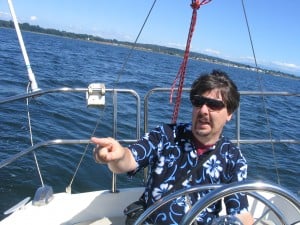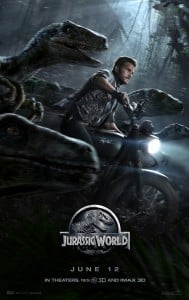U2 begins their fourteenth album by counting to fourteen in Spanish: Uno, Dos, Tres, Catorce!!
The numbers correspond to the U2 albums on which Steve Lillywhite worked as a producer. And that’s only one of the ways in which How to Dismantle an Atomic Bomb symbolizes the completion of U2’s stylistic adventures and Bono’s prodigal-son journey from innocence into darkness and back again.
Granted, for the counting-theory to make sense, you have to count U2’s Best-Of collections in the fourteen. Otherwise, you’ll be up all night arguing about what else it might mean. (Many seem eager to claim that Bono just screwed up. Which is entirely possible, but these recordings get checked by a lot of ears before they’re released, you know.)
But the line can indeed represent other things. It wouldn’t be far off the mark to say that the album starts out by taking the volume knob and turning it up, all the way past ten to fourteen, thus one-upping the old Spinal Tap joke. It would also make sense to say that the jump from “tres” to “catorce” is an appropriate intro to a song that’s about moving too fast and losing balance in an off-kilter world.
Whatever the case, Bono’s count-off launches an album that has U2 fans arguing even as they’re dancing and playing air-guitar. You may love the album. You may be disappointed. But there’s no denying it’s one of the loudest, most forceful, and most radio-ready of the band’s sensational career.
Is it their best? Their worst? A reinvention? A return to their roots? There is no final answer. Most agree that it’s on par with their best, assuming that The Joshua Tree and Achtung Baby are the peaks and that the 90s were an embarrassment. Personally, I’d disagree–I would choose those two titles as the peaks and call the 90s a fascination and courageous exploration, but that’s a tangent. A far more rewarding question is: What’s is How to Dismantle an Atomic Bomb all about? What perspective do Bono and Company have to share with us that differs from previous records?
I’ve written this review twice. The first time came after four listens to the album, all on my computer, or on Seattle radio (which has been playing the whole album far too much for over a week). It was, in general, a complaint that U2 had lost their wanderlust. They’d quit blazing new trails for rock music. They now seemed content to merely sharpen their most popular tools. But then I heard the album on “the big stereo” (an enthusiastic plug here for the Sony Dream System) and it sounded like a completely different record, meticulously produced to preserve layer upon layer of pristinely recorded sound, capturing some of the band’s most vibrant, energetic, and confident performances. And Bono’s lyrics, while occasionally clumsy and preposterous (as always), achieve some powerful poetry, his metaphors intensely interconnected, so that the songs come together as a cohesive vision. It may not be new territory, but they’ve discovered some pretty impressive new peaks in the midst of familiar scenery.
So I trashed the first review and started over.
The Sound of U2 #14
How to Dismantle an Atomic Bomb is, in short, nine songs in the classic U2 hit-single mode … grand, contagious, illuminated, sexy rock anthems that either start with a bang and end with an emotional, euphoric finale, or start out cautiously meditative and build to (of course) an explosive, euphoric finale. The other two songs are more experimental: one, a brash and swaggering rock ultimatum and the other a groovy Motown-tinted love song with acoustic guitars and a heavy dose of Adam Clayton. But overall, it is, as so many have said, U2 relying on their strengths, and sharpening the best of what they’ve done in the past so that … for the first time ever, perhaps … they’ve completed an album without any filler songs. Pull three songs out of the middle, and they’re every bit as strong as the first three. On almost every previous record, you could bet that the first four songs were the big ones, and the rest carried the subtitle “and other stories.” Here, every song is an event, everything worthy of a place in their upcoming tour.
There’s another difference: The confidence with which they perform these songs. On Pop and Zooropa and at least half of All That You Can’t Leave Behind, you can tell the songs were recorded while the ideas were still young, still searching for their best manifestation. Later live performances would show that the band had settled into them and trimmed the fat. (For example, “Staring at the Sun” finally peaked as an acoustic showstopper in the live shows.)On this album, it feels like they’ve driven these songs several hundred miles already, and they know how best to deliver them. Thus, they come out knowing the plays they’re going to run to get those touchdowns.
Yet another striking thing about this album … it’s the first U2 album I can think of where the strongest run of songs happen in the middle instead of at the beginning. They’ve always seemed to come at you with the songs they feel are strongest and then offer the more exploratory songs later. This time, the thing just builds and builds.
Let’s look at the songs, and what’s going on beyond their shiny, searing surfaces.
Eleven Songs
There are several recurring themes that run through the album:
- The world is off-balance and going wrong.
- The more you see of it, the harder it is to see anything clearly, so hang on to the innocent perspective of a child as long as you can.
- True, faithful, unwavering love … not just between a man and a woman, but between a father and a son, between a mentor and a child, between one nation and another … is the only way to preserve innocence in the midst of it.
- If we survive at all, it’s because of God’s blessings.
- So the proper response is to share the blessings we’ve been given rather than hoarding them, to kneel, and call on one of God’s many sacred names, in what little time we have left.
This is an older, wiser U2, the grownup looking back at the boy and at the reckless adolescent, and smiling sadly. At the same time, it’s a band that knows their days are numbered, that can see the end coming, and that are ready to start framing their phrases as fatherly … perhaps even grandfatherly … advice.
VERTIGO
The first single, “Vertigo,” places second only to “Elevation” as the most unapologetically fun U2 song ever. It feels like Edge’s guitar dream come true, a riff as catchy as “The Fly” and “Mysterious Ways” yet running at a hundred miles an hour. The song’s so fast, it’s like he’s daring Bono to keep up. And then it explodes into a chorus that sounds like a tribute to the Ramones. Here, it’s clear that Bono has rediscovered the voice of his younger self, and he’s hitting notes he shouldn’t be able to at his age.
It’s about a state of mind in which you’re confused between serving your thoughts and your feelings. The world is tilting, and “though a feeling is so much stronger than a thought, your mind can wander.” In what might be a literal jungle, but sounds more like a nightclub, the singer is clinging to quiet reminders of faith, like a crucifix necklace worn by a temptress. He bemoans the things he wishes he didn’t know, until, at last, he cries out to his Everlasting Teacher to teach him how to kneel. And so the framework for the whole album is set up. The prodigal son, U2’s central character through the narratives of Achtung Baby all the way through Pop, is back, and he’s at the end of his rope. He knows who to call for help and he’s ready to complete the journey.
MIRACLE DRUG
This song is the closest thing to a “cookie-cutter U2 song” on the album, a meditative verse that builds to a ramp-like bridge and a chorus that launches us into a huge, roaring anthem. Larry pounds the drums like it’s his last night on earth, and Edge is in full Achtung mode here.
It’s sung by someone, a caregiver or a mother or a friend, who stands over a dying man calling upon God and upon the tools God has given us … reason and science … to find some way to save him. And yet, it is the observer who is changed by the experience. He (or she) sees “the songs” in the dying person’s eyes, and swears off the dissatisfying pursuits of romantic love in hopes of finding something more fulfilling, a “miracle drug” that just may be an expression of faith in the resurrection, an affirmation of the power of love.
Leave it to Bono to give us a song of heroism and hope from trying to take a trip inside the head of his paraplegic friend who reportedly inspired the song.
SOMETIMES YOU CAN’T MAKE IT ON YOUR OWN
“Sometimes You Can’t Make It On Your Own” is cut from the same cloth as “One,” a classic U2 power ballad that builds to “With or Without You” or “Kite”-level intensity, blending all of the band’s strengths into a monument to Bono’s relationship with his father, who died in 2001. It details many of their intimate exchanges, the fights, the similarities, the need they have to love each other even to the bitter end.
You can tell this is, to Bono, one of the most important songs of his life. “It’s you when I look in the mirror … Can you hear me when I sing? / You’re the reason I sing / You are the reason why I have the operas in me.”
LOVE AND PEACE OR ELSE
In one of the album’s two most experimental tracks, “Love and Peace Or Else” distinguishes itself as a song of rock-star swagger, with a guitar line as macho and arrogant and obscenely brusque as anything they’ve ever played. It is, quite frankly, hilarious. And with lyrics that fit the bill, Bono boils all of his poetry down to big, heavy slogans, until the song collapses on itself at the end with Bono repeating (somewhat unfortunately) “Where is the love?”
It is, believe it or not, a song about the Israeli/Palestinian conflicts and all of the age-old religious grudges that cause so many killings. Hardly a new subject for U2, and expressed in the most heavy-handed way they’ve ever served up. In its memorable, glam-rock-stomp brashness, it earns its place on the album, but it’s disappointing that they didn’t come up with a more satisfying conclusion.
CITY OF BLINDING LIGHTS
This one’s for those who love the arena-rock glory of “Where the Streets Have No Name.” Structured with Edge’s piano-note punctuation marks (the album’s most annoying motif), those accelerating guitars of The Unforgettable Fire build and build until the song feels like a joy ride through New York at night with the top down. The chorus was tailor-made for a crowd of thousands to chant together: “OH. YOU. LOOK. SO. BEAUUUUUUTIFUL. TONIIIIIIIGHT.”
It’s possible that this song could even replace “Where the Streets Have No Name” in the set list for the upcoming tour. Emotionally, it covers some of that territory.
And yet there’s some clever wordplay: He’s declaring the beauty of the city, even though its lights are blinding and he’s losing his own vision (“The more you see, the less you know…”). And yet, the effects of aging haven’t taken “the boy out of this man.” He’s still curious, still ambitious, still full of dreams, despite the cost. Where “Vertigo” showed him sick of the jungle, here he seems to remember what he loves about it all.
ALL BECAUSE OF YOU
One of the album’s highest highlights, “All Because of You” may be the most confidently performed rock single of U2’s career. It has the careening guitar motif of “Even Better Than The Real Thing,” and messes it up a bit with some raw Rolling Stones energy. And here comes Bono’s first song of adoration to God, one of several tracks that distinguish this as the band’s most blatantly religious album since October.
This is the song in which the Prodigal Son seems to embrace his father at last. He gives credit for anything good in his life to the one who blessed him with life. And in my favorite lyrical trick on the album, (no, not the way Bono rhymes “voice” with “tortoise”), Bono refers to God by the name the Almighty gave himself … “I AM.” It’s easy to miss that, but reading the lyrics, you’ll see how each verse builds to this chorus:
“All because of you
All because of you
All because of you
I am.”
In one sense, he’s saying “Because of you, I (Bono) yam what I yam.”
In another, he’s saying, “Because of you, God (I AM.)”
Take off your shoes, folks. He’s on holy ground.
A MAN AND A WOMAN
My personal favorite song is the only one that relies on acoustic guitars. I like it primarily because it’s U2’s boldest stylistic move on this record … it’s a song that doesn’t sound like U2. This bluesy tribute to true love and marital fidelity, clearly a tribute to his wife Ali, shows Bono in peak condition, and allows Adam Clayton and Larry Mullen, Jr. to take the spotlight more prominently than they have in a while. It’s a nice break from the fire and intensity of the rest of the record. It also employs some of Bono’s most artful and moving lyrics about love ever.
CRUMBS FROM YOUR TABLE
“Crumbs from Your Table” should be sung, or at least read, to every church in the world. It’s from the “Big, Soaring, Angst-Heavy Anthem” file, like “Acrobat” or “Kite,” and this time Bono’s laying down the law for the people of God, asking them to give up their brutal legalism (“With a mouthful of teeth, you ate all your friends….”) because they’re alienating themselves from the people they’re supposed to serve. I couldn’t help but think of how many powerful talents have been driven from the church because they were either exploited or condemned. I think of Bob Dylan and Sam Phillips. But ultimately, it’s Africa that’s on Bono’s mind. He wants “to believe,” and clearly he already believes in God, so here he must want to believe in the power of the church. But he’s waiting for evidence that we ourselves will follow Christ’s example and give some of the riches he has given to us. “I’m waiting on the crumbs from your table.”
A masterful, necessary, and brutally honest song.
ONE STEP CLOSER
Returning again to his father’s deathbed, Bono reflects on those final steps, approaching the kingdom. He feels his own age, as the future is “getting away from” him; “I can see the taillights glowing … Can you hear the drummer slowing?”
Please welcome Daniel Lanois. Lanois rejoins the band he loves and provides some haunting pedal steel effects, turning one of U2’s simplest songs into a ghostly, hushed, and haunting piece. Bono can write songs like this in his sleep, so it’s not a particularly impressive melody. But the lyrics are refined and the production makes it all worthwhile. You’ve just got to turn it up to really appreciate it.
ORIGINAL OF THE SPECIES
In one of the album’s two slight miscalculations, Bono turns in another Rolling Stones-style rocker that strains his voice and our patience. At this point in the album there have been so many euphoric highs, it’s hard to feel thrilled about another one, especially with the awkward “doo-doo, doo-doo, doo-doo” section in the middle.
The song sees Bono taking the pose of an older man, a counselor to a young woman (some say it’s dedicated to Edge’s god-daughter), reminding her not to try to grow up too fast, but to hang on to her innocence. I think the band miscalculated the proper tone of this song. It should sound, well, fatherly, not like a swaggering rock star flaunting his own attitude. Sure, Edge is great, and on its own this song could be a radio single highlight. But here, beauty would have been more effective than intensity.
YAHWEH
A DJ on Seattle’s alternative rock station The End (107.7) introduced this song a week early by saying, “I’m not sure what this song’s really about. But I’m gonna play it for you because it has a funny title: ‘Yeah, way.’ Bono, he’s always singing funny sounds and makin’ things up. And so I guess he just called the song, ‘Yeah, way!'” That guy’s probably still trying to pull his foot out of his mouth somewhere.
“Yahweh” is a suitable conclusion, if not quite as distinct as a song with this title should be. Even more regrettably, it copies U2’s own lyric pattern for “Do You Feel Loved?” from Pop, with verses that run variations of “Take (this/these) (heart/shirt/hands) ….” But it’s still a profound, moving, uplifting prayer, buoyed along on joyful guitars, and the promise that after all of this darkness and pain, a new world, a new life, a clean and redeemed new existence will be born.
And so we wrap up with a glimpse of the coming redemption, and that element that is so hard to capture musically: joy. We arrive at Bono’s final appeal: That God cause our hearts to break, because only through being broken will we come to know Christ’s brokenness and his love for us, and only through being humbled will we be led to give of ourselves to those in need.
UNTIL NEXT TIME…
And where do we go from here?
Ahhh, why bother wondering. U2 have never given us reason to doubt their judgment, really. Sure, many have questioned their judgment, but that was because they wanted the band to stand still and put out replications of their earlier successes. Thankfully, they refused, following the Spirit along mysterious ways, into brave new worlds of sound and adventure and experimentation. Without those journeys, those discoveries, their loyal and attentive listeners would have missed out on glorious highs, and today we wouldn’t be hearing the confident, experienced band we’ve got on this album.
The fact that U2 is closing in on 30 years together is remarkable, and the fact that they’re as talented and as focused on excellence as ever sets them apart from … let’s face it … every other band on the planet and perhaps in rock history. The Beatles couldn’t last this long, and they never connected with our hearts the way U2 does because they never realized their need to appeal to a higher power for help. The Rolling Stones stopped writing cutting-edge, relevant rock ages ago. The Who … where are they? R.E.M.’s Reveal was a revelation, but their latest, Around the Sun, might as well be filed under “Elevator Music.” We’ll see Stipe and Friends soon on a PBS special for a nostalgic, middle-aged, sit-down crowd; they’ll go the way of Sting now. U2 have proven that great bands don’t have to burn out early (Nirvana), break up into solo careers (The Beatles), crumble under unhealthy habits (The Rolling Stones) or fade away slowly (R.E.M.). They’ve burned oh so brightly, and apparently, will continue to do so.
Until 2001, U2 took the road less traveled by. With All That You Can’t Leave Behind, and now again with How to Dismantle an Atomic Bomb, it feels like they’ve changed their minds, that they’re trying to turn back the clock and take the road most predictable.
I prefer U2 the trailblazers. But I’m more than content to accept whatever they choose to offer at this point, because I trust them. And what we’ve got here is the best rock and roll album of the year.











